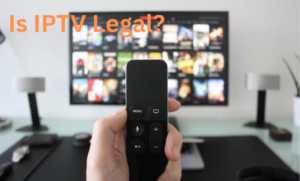Internet Protocol Television (IPTV) is a widely used technology that delivers television content over the internet. It offers access to thousands of live TV channels, movies, TV series, and video-on-demand content.
However, concerns regarding the legality of IPTV services frequently arise, as both licensed and unauthorized providers exist in the market.
This guide explores the legal aspects of IPTV streaming to help users make informed decisions.
Understanding IPTV
IPTV, or Internet Protocol Television, is a service that streams television content via the internet rather than traditional cable or satellite networks.
It provides access to entertainment content from across the globe and includes features such as Personal Video Recorder (PVR), Electronic Program Guide (EPG), Anti-Freeze technology, TV catch-up, and simultaneous streaming options, depending on the provider.
Additionally, IPTV is compatible with various streaming devices and is relatively simple to set up.
Is IPTV Legal?
As mentioned earlier, IPTV services vary in terms of legality. Some providers distribute licensed content through authorized channels, similar to mainstream services like Sling TV, YouTube TV, and Hulu.
However, others may offer content without proper licensing, making it difficult for users to determine whether an IPTV service is legal.

Legal Framework Against Unauthorized IPTV Services
Governments across different countries have implemented laws to combat illegal IPTV streaming. Below is an overview of some key legal acts:
| Region | Law | Penalties |
|---|---|---|
| United States | Digital Millennium Copyright Act (1988) | Up to 5 years in prison and fines exceeding $250,000 |
| United States | Protecting Lawful Streaming Act (2020) | Up to 10 years in prison and additional fines |
| Canada | Copyright Act (1921) | Up to 2 years in prison and fines exceeding $1,000,000 |
| United Kingdom | Digital Economy Act (2017) | Up to 10 years in prison |
How to Identify Legal IPTV Providers
Given the prevalence of unlicensed IPTV services, distinguishing between legal and illegal providers can be challenging. Here are some key factors to consider:
- Affiliation with Telecom or Internet Service Providers – IPTV services operated by established telecom companies or independent internet service providers (ISPs) are more likely to be legitimate.
- Government Registration – In Canada, for instance, IPTV services registered with the Canadian Radio-television and Telecommunications Commission (CRTC), such as Bell, are legal.
- Availability on Official App Stores – IPTV services that offer a native application available on official platforms like the Apple App Store, Google Play Store, or Amazon Appstore are more likely to be licensed.
Legal vs. Illegal IPTV Services
Understanding the differences between legal and illegal IPTV services can help users avoid potential legal consequences.
| Legal IPTV Services | Illegal IPTV Services |
|---|---|
| Hold proper content distribution licenses | Operate without content distribution rights |
| Utilize stable and reliable servers | Frequently experience service disruptions |
| Offer transparent payment methods | Payments are often untraceable |
| Have a long-standing official website | Websites are frequently taken down |
| Provide reasonable and competitive pricing | Offer significantly lower prices |
How to Recognize Unauthorized IPTV Services
Illegal IPTV services, often referred to as “gray market” providers, operate without obtaining proper licenses for the content they distribute. Indicators of an unlicensed IPTV service include:
- Lack of registration with regulatory bodies such as the CRTC
- Offering an extensive number of channels and video-on-demand content at suspiciously low prices
- Frequent service outages and website shutdowns without prior notification
- Poor streaming quality, including inconsistent audio and video playback
Alternate IPTV:
Risks Associated with Illegal IPTV Services
Accessing unauthorized IPTV services can expose users to several risks, including:
- Financial Theft – Unregistered IPTV providers may steal credit card and banking details during the payment process.
- Data Privacy Breaches – Personal information may be sold to third parties or cybercriminals.
- Device Security Threats – Malware and viruses may be embedded within IPTV service websites, causing system vulnerabilities.
- Fraudulent Websites – Many illegal IPTV service websites contain fake download links and misleading play buttons.
- ISP Penalties – Internet service providers (ISPs) may suspend or terminate accounts that access unauthorized IPTV services.
Guidelines for Launching a Legal IPTV Service
IPTV is an attractive business opportunity, as consumers worldwide seek convenient access to their favorite sports, movies, and TV shows.
If you are considering launching an IPTV service, follow these steps to ensure compliance with legal standards:
- Obtain Proper Licensing – Secure distribution rights from the appropriate content owners before offering any programming.
- Ensure Transparent Pricing – Offer clear and legitimate subscription plans with verifiable payment processing.
- Global Accessibility – Verify that the content you provide can be legally accessed in different regions.
- Provide Versatile Access – Offer content delivery options such as M3U files and Xtreme Codes API, enabling compatibility with various devices.
- Prioritize Security – Avoid incorporating malware in your website or app and implement robust user security measures.
Frequently Asked Questions (FAQ)
How can I stream IPTV services safely?
To stream IPTV safely, always use a Virtual Private Network (VPN) to mask your IP address and enhance online security. We recommend using NordVPN for added protection.
Is IPTV legal in the United States?
No, streaming unauthorized IPTV services in the United States is illegal. However, licensed IPTV services such as YouTube TV and Hulu Live are legal.
What are some examples of unregistered IPTV providers?
Some unregistered IPTV providers include Rapid IPTV, BD IPTV, and Pure IPTV. These services operate without proper licensing.
What are the best alternatives to IPTV?
Popular alternatives to IPTV include Netflix, Amazon Prime Video, and Disney+, which offer licensed, high-quality streaming content.
![Is IPTV Legal to Stream? [Comprehensive Guide]](https://www.iptvpicks.com/wp-content/uploads/2025/02/IPTVPICKS.COm-28.jpg)















